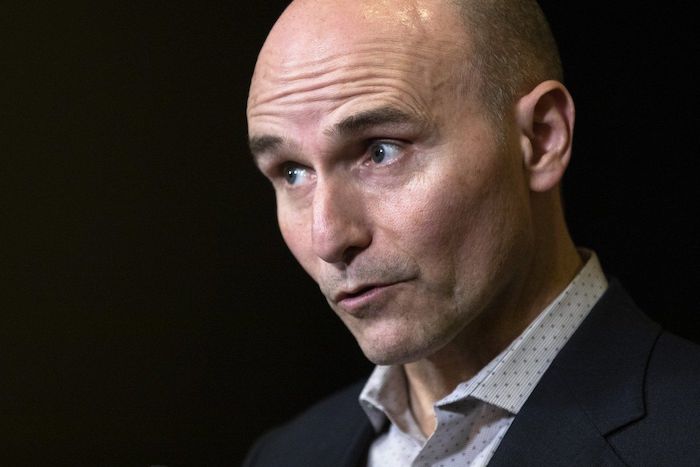Business
Head of Canada’s drug price regulator resigns same week as colleague steps down

The executive director of Canada’s drug pricing regulator is stepping down — just days after another member resigned because of concerns that the federal government was undermining the regulator’s work.
Douglas Clark, executive director of the Patented Medicine Prices Review Board, announced today he will be leaving his post after almost a decade with the regulator.
On Thursday, Matthew Herder, a professor of health law at Dalhousie University, announced he had resigned from the board, accusing the federal government of failing to implement critically important reforms that would lower the cost of medication.
Herder said in his resignation letter addressed to federal Health Minister Jean-Yves Duclos that he is stepping down because he no longer believes it is possible to serve the public good in this role, which he had held since 2018.
Herder responded today on social media to news of Clark’s resignation, calling it an immense and irreplaceable loss.
Clark has agreed to remain with the board as a special adviser for an unspecified amount of time, and the board says work to appoint Clark’s successor will be launched soon.
The Patented Medicine Prices Review Board regulates the prices of patented medicines sold in Canada.
This report by The Canadian Press was first published Feb. 24, 2023.
Business
WEF panelist suggests COVID response accustomed people to the idea of CBDCs

Central Bank of Bahrain governor Khalid Humaidan
From LifeSiteNews
When asked how he would convince people that CBDCs would be a trusted medium of exchange, Bahrain’s central bank governor said that COVID made the digital transformation ‘something of a requirement’ that had ‘very little resistance.’
Central bank digital currencies (CBDCs) will hopefully replace physical cash and become fully digital, a central banker tells the World Economic Forum (WEF).
Speaking at the WEF Special Meeting on Global Collaboration, Growth and Energy Development on Sunday, Central Bank of Bahrain governor Khalid Humaidan told the panel “Open Forum: The Digital Currencies’ Opportunity in the Middle East” that one of the goals of CBDC was to replace cash, at least in Bahrain, and to go “one hundred percent digital.”
Humaidan likened physical cash to being an antiquated “analogue” technology and that CBDC was the digital solution that would hopefully replace cash:
"We're probably going to stop calling it central bank digital currency [CBDC]. It's going to be a digital form of cash, and at some point in time hopefully we will be able to be 100% digital": Central Bank of Bahrain Governor Khalid Humaidan to the WEF https://t.co/Pspr0M1Uuq pic.twitter.com/N5aOkCpzh1
— Tim Hinchliffe (@TimHinchliffe) April 29, 2024
“I thank this panel and this opportunity. It forced me to refine my thoughts and opinions where I’m at a place comfortably now that I’m ready to verbalize what I think about CBDC,” said Humaidan.
If we think cash is the analogue and digital currency is the form of digital – CBDC is the digital form of cash – today, clearly we’re in a hybrid situation; we’re using both.
We know in the past when it comes to cash, central bankers were very much in control with all aspects of cash, and now we’re comfortable to the point where the private sector plays a big role in the printing of the cash, in the distribution of the cash, and with the private sector we use interest rates to manage the supply of cash.
The same thing is likely to happen with CBDC. Yes, the central bank will have a role, but at some point in time – the same way we don’t call it ‘central bank cash’ – we’re probably going to stop calling it central bank digital currency.
“It’s going to be a digital form of the cash, and at some point in time hopefully we will be able to be one hundred percent digital,” he added.
When asked how he would convince people that CBDC would be a trusted medium of exchange, Bahrain’s central bank governor said that people were already used to it and that COVID made the digital transformation “necessary” and “something of a requirement” that had “very little resistance.”
"There's less use of cash […] The transition to fully digital is not going to be a stretch […] People are used to it […] Its adoption rates increased because of COVID […] There is very little resistance": Central Bank of Bahrain Governor Khalid Humaidan to the WEF on CBDC pic.twitter.com/zB7nJAi48G
— Tim Hinchliffe (@TimHinchliffe) April 29, 2024
“Right now, many of our payments are digital. The truth is, I said that we’re in a hybrid model; there’s less and less use of cash,” said Humaidan.
I think from predominantly digital with a little physical, I think the transition to fully digital is not going to be a stretch.
People are used to it, people have engaged in it and certain circumstances did help. Its adoption rates increased because of COVID.
“This is where contactless started to become something of a necessity, something of safety, something of a requirement, and because of that there is very little resistance; trust is already there,” he added.
"Is it [digital euro] going to be as private as cash? No. A digital currency will never be as anonymous and as protecting of privacy in many respects as cash, which is why cash will always be around": Christine Lagarde, BIS Innovation Summit, March 2023 #CBDC pic.twitter.com/BLMVOPax6a
— Tim Hinchliffe (@TimHinchliffe) April 11, 2023
Meanwhile, European Central Bank president Christine Lagarde has been going around the world telling people that the digital euro CBDC would not eliminate cash, and that cash would always be an option.
Speaking at the Bank for International Settlements (BIS) Innovation Summit in March 2023, Lagarde said that a digital currency will never be as anonymous as cash, and for that reason, cash will always be around.
“Is it [digital euro] going to be as private as cash? No,” she said.
A digital currency will never be as anonymous and as protecting of privacy in many respects as cash, which is why cash will always be around.
If people want to use cash in some countries or in some transactions, cash should be available.
“A digital currency is an alternative, is another means of payment and will not provide exactly the same level of privacy and anonymity as cash, but will be pretty close in terms of complete neutrality in relation to the data,” she added.
A WEF Agenda blog post from September, 2017, lists the “gradual obsolescence of paper currency” as being “characteristic of a well-designed CBDC.”
"You could have a potentially […] darker world where the government decides that [CBDC] can be used to purchase some things, but not other things that it deems less desirable like say ammunition, or drugs, or pornography, or something of the sort": Eswar Prasad, WEF #AMNC23 pic.twitter.com/KkWgaEWAR5
— Tim Hinchliffe (@TimHinchliffe) June 28, 2023
Last year at the WEF’s 14th Annual Meeting of the New Champions, aka “Summer Davos,” in Tianjing, China, Cornell University professor Eswar Prasad said that “we are at the cusp of physical currency essentially disappearing,” and that programmable CBDCs could take us to either a better or much darker place.
“If you think about the benefits of digital money, there are huge potential gains,” said Prasad, adding, “It’s not just about digital forms of digital currency; you can have programmability – units of central bank currency with expiry dates.
You could have […] a potentially better – or some people might say a darker world – where the government decides that units of central bank money can be used to purchase some things, but not other things that it deems less desirable like say ammunition, or drugs, or pornography, or something of the sort, and that is very powerful in terms of the use of a CBDC, and I think also extremely dangerous to central banks.
The WEF’s Special Meeting on Global Collaboration, Growth and Energy Development took place from April 27-29 in Riyadh, Saudi Arabia.
“Saudi Arabia’s absolute monarchy restricts almost all political rights and civil liberties,” according to D.C.-based NGO Freedom House.
In the kingdom, “No officials at the national level are elected,” and “the regime relies on pervasive surveillance, the criminalization of dissent, appeals to sectarianism and ethnicity, and public spending supported by oil revenues to maintain power.”
Reprinted with permission from The Sociable.
Business
Parliamentary Budget Officer forecasts bigger deficits for years to come

From the Canadian Taxpayers Federation
Author: Franco Terrazzano
“Every penny collected from the GST will now go to cover interest charges on the Trudeau government’s credit card”
The Canadian Taxpayers Federation is calling on the federal government to cut spending and balance the budget following today’s Parliamentary Budget Officer report forecasting higher deficits.
“Budget 2024 was bad, but the PBO report forecasts the Trudeau government will be running even bigger deficits,” said Franco Terrazzano, CTF Federal Director. “This PBO report should be a wake-up call for Prime Minister Justin Trudeau: get a hold of your spending or interest charges will keep ballooning.”
The PBO projects a $46-billion deficit this year. Budget 2024 projected a $40-billion deficit.
“PBO’s projected budgetary deficits are $5.3 billion higher annually, on average, over 2023-24 to 2028-29,” according to the report.
In Budget 2023, Finance Minister Chrystia Freeland said the government would find “savings of $15.4 billion over the next five years.”
However, “in Budget 2024, the government announced $61.2 billion in new spending,” according to the PBO. “Since Budget 2021, the government has announced a total of $251.6 billion in new spending measures.”
Interest charges on the debt are expected to cost taxpayers $54 billion this year, according to Budget 2024.
“Every penny collected from the GST will now go to cover interest charges on the Trudeau government’s credit card,” Terrazzano said. “Trudeau must balance the budget, cut spending and stop wasting more than $1 billion every week on interest charges.”
-

 Uncategorized2 days ago
Uncategorized2 days agoMaking Alberta a geothermal energy leader
-

 Alberta2 days ago
Alberta2 days agoThree Calgary massage parlours linked to human trafficking investigation
-

 Alberta1 day ago
Alberta1 day agoAlberta’s vision for passenger rail
-

 conflict1 day ago
conflict1 day agoColumbia on Lockdown After pro-Palestinian Protesters Take Over Building, Hold Janitors Hostage
-

 Canadian Energy Centre1 day ago
Canadian Energy Centre1 day agoNorth America LNG project cost competitiveness
-

 John Stossel2 days ago
John Stossel2 days agoWhy Biden’s Just Wrong: NO ONE “Knows How to Make Government Work.”
-

 COVID-191 day ago
COVID-191 day agoStates move to oppose WHO’s ‘pandemic treaty,’ assert states’ rights
-

 Business1 day ago
Business1 day agoParliamentary Budget Officer forecasts bigger deficits for years to come







